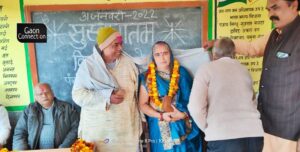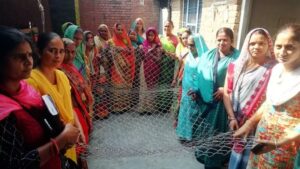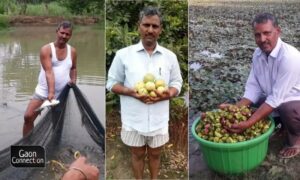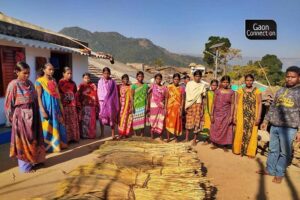Kanjikovil (Erode), Tamil Nadu
A little off the National Highway 544, is the town panchayat of Kanjikovil, where on July 31, preparations were afoot in a marriage hall, ahead of the Nel Thiruvizha, or the seed festival. The festival is usually held in the end of May before paddy sowing begins in Tamil Nadu, but was delayed this year due to the pandemic.
The annual thiruvizha sees hundreds of paddy farmers from across the state congregate at one venue to discuss organic rice cultivation in the state, and share heritage paddy seeds with one another. This unique seed festival took root 15 years ago and has already managed to revive more than 150 traditional paddy varieties in the state.
This year, instead of one annual event, usually held at Thiruvarur, thiruvizhas have been organised at Tiruvannamalai, Erode, Cuddalore, Thiruvarur and Chengalpet, Madurai, and Tirunelveli districts of the state.
Inside the marriage hall at Kanjikovil, five varieties of heritage paddy seeds –Mapillai Samba, Thanga Samba, Sornamusiri, Kichili Samba and Thooya Malli — packed into auspicious yellow cloth bags (called manja pai), awaited the farmers who were coming there from several districts. Nearly 150 organic paddy farmers from Erode, Namakkal, Sathyamangalam and Gobichettipalayam districts gathered at Kanjikovil in Perundurai taluk, in Erode district, about 415 kms south west of the state capital of Chennai.
Also Read: Bringing the desi back into cotton
“The farmers will take two kilos of their choice of heritage seeds, and we encourage them to return the following year with double the amount of seeds, which then we distribute free to other farmers,” P Duraisingham, chairperson, Consumer Research Education, Action, Training and Empowerment (CREATE), told Gaon Connection.
“Do you see the white stripe on the edge of our green thundus (a strip of cloth farmers throw over their shoulder)? While all Tamil Nadu farmers wear a plain green thundu, the added white stripe identifies us as organic cultivators,” explained Duraisingham with pride.
Creating awareness about rice
CREATE, a non-profit based in Paramakudi, Ramanathapuram district, has been at the forefront of the first edition of the Nel Thiruvizha since it began in 2006, at Thiruthuraipoondi, in Thiruvarur district. It has worked closely with farmers in the state, encouraging them to go organic and providing them support.
Suresh Kanna, project director of CREATE, who was bustling about, giving last minute instructions to someone over his mobile, stopped long enough to explain the significance of the thiruvizha.
“Nearly five thousand farmers have taken part every year in the thiruvizha and taken away heritage paddy seeds from it that they in turn share with fellow farmers in their villages and districts,” Kanna said. “It is hard to give the exact numbers, it could be anything from seventy five thousand to one lakh farmers who have been part of the thiruvizha movement since its inception,” he added.
No one knows exactly how many varieties of indigenous rice there were in Tamil Nadu. Some say there were more than 20,000 varieties. Sadly, many of them can be found now only in lore or in the fading recollections of elderly farmers. “But CREATE has managed to revive the cultivation of hundred and fifty five varieties of those rices,” Kanna said. Meanwhile, Global Greengrants Fund, a US-based charitable foundation, that supports grassroots-led efforts to protect the planet and the rights of people, has given a project grant to CREATE to carry forward its seed conservation and seed festival initiative.
Also Read: A library for rice with grains from the past
The rice activists believe that traditional, heritage rice varieties are more sustainable, are easier to grow, have good yields and carry within them medicinal qualities. Traditional and indigenous medicines incorporate many of these rice varieties in them.
The history of Nel Thiruvizha
The Nel Thiruvizha in Tamil Nadu was born out of the Save Our Rice Campaign that had its roots in Kumbalangi village in Kochi, Kerala, known for its traditional pokkali paddy cultivation system (fish and rice).
“In 2004, we held a two-day workshop there for farmers and those associated with rice farming. Pesticide Action Network, Asia Pacific joined in and paddy experts from Malaysia, Philippines and Thailand. Rice farmers from 10 states in India attended too,” Usha Soolapani, Trivandrum-based rice activist, and the co-founder of Thanal, an environmental organisation, told Gaon Connection. The 58- year-old Soolapani has been in the forefront of environmental movements in Kerala and nationally against use of chemical fertilisers and pesticides and genetically modified seeds.
G Nammalvar, green crusader, agricultural scientist, environmental activist and organic farming expert attended the Kumbalangi workshop in 2004 and described it as ‘Historical’. “It was through him that we took our campaign to save indigenous varieties of paddy to Tamil Nadu, where we worked in partnership with CREATE, which is spearheading the campaign in the state,” Soolapani said.
Along with Nammalvar, Nagarcoil-based R Ponnambalam, who retired as superintendent of regulated market, also attended the Kumbalangi workshop. Ponnambalam recalled he went to the 2004 workshop in Kerala bearing five varieties of indigenous rice from Tamil Nadu. He has been the Managing Trustee of CREATE since its inception.
“Every year we reach out to thousands of farmers. At Nel Thiruvizha, problems facing organic rice cultivation and policies are discussed. And we submit those to the government,” the 77-year-old Ponnambalam told Gaon Connection. “We are pressing the government to declare an organic policy. We hope something will come out of it,” he said.
According to Ponnambalam, no Nel Thiruvizha goes by without the government being informed about it and invited to participate. “Hundreds of voluntary organisations are following the Nel Thiruvizha model,” he added. He said the state government had also reached out to them to help spread the message of organic cultivation across the state.
Meanwhile, the Save Our Rice movement, which works to conserve rice-ecosystems, revive traditional agricultural practices and promote a sustainable and organic system of paddy cultivation, has created rice diversity blocks and seed banks of indigenous rice varieties, across seven states of Kerala, Tamil Nadu, Karnataka, West Bengal, Chhattisgarh, Jharkhand and Madhya Pradesh.
Also Read: A village in Bihar switches to organic farming, sets an example
Sharing traditional knowledge
Back at Kanjikovil, 66-year-old paddy farmer Mohana Sundaram who also wore his green thundu with the white stripe like a badge of honour, gave an impassioned talk on organic farming and its sustainability. As Sundaram spoke of the health benefits of the traditional rice, delicious kanji (gruel) made of karuppu kavuni rice (black rice) was served to the gathering. Karuppu kavuni was considered so special, that, lore goes, only royalty had the right to eat it. This variety is mostly grown in the eight Cauvery delta districts in Tamil Nadu.
“One of the thiruvizha’s missions is to back up anecdotal advantages of certain rices with scientific proof,” Duraisingham said. “The first several years were focussed on getting farmers to turn to organic cultivation, seed saving, etc., but this year, CREATE will pay special attention to marketing,” he said.
Paddy farmers from Gobichettipalayam district, Kumar Karuppanasamy and Venkatachalam Kandasamy, had brought along the kala namak and ilupaipoo samba varieties of rice they had grown, to sell.
Also Read: This ‘seed woman’ never went to school, but has valuable lessons for us and the farmers
Consumers are key to conservation
“Conserving traditional or indigenous rice varieties is not the responsibility of the farmer alone. It is a shared responsibility that we as consumers need to partner with the farmers,” Sreedevi Lakshmikutty, rice activist for 12 years, and who was a part of the Save Our Rice campaign, told Gaon Connection. She is also co-founder of Bio Basics that directly supports organic farmers and reaches their produce to consumers.
“We have to bring home and eat these rices, learn their names, recognise the flavours and valorise the varieties,” she said.
“Our sustained interest and use of these rices is what will motivate farmers to grow the indigenous varieties season after season,” Lakshmikutty pointed out.
Also Read: The alu-jeera and dal-tadka philosophy of Ranveer Brar’s cooking
After a lunch of tomato rice made of rich, chewy mapillai samba rice and served with potato curry and a millet and curd dish, the farmers made their way home from Kanjikovil carrying their precious manja pai bearing the heritage paddy seeds, promising to be back next year with more heritage paddy seeds that could be shared.
“I wish our chefs would acknowledge and use heritage grains, and enthuse people to try them. It would put our farmers and the grains they grow on the map, and give them the respect they deserve,” Lakshmikutty concluded.



















